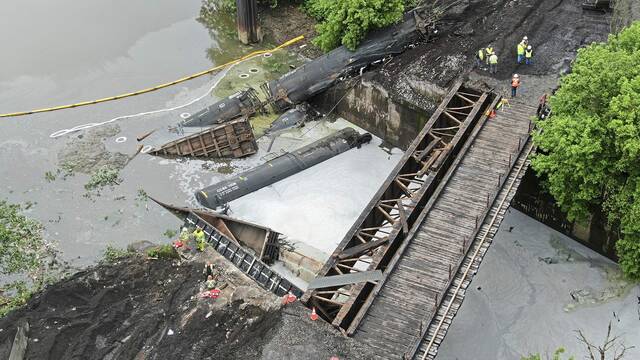Bruce Castor: No pipelines means more coal, less safety
The Pittsburgh metro area has emerged as one of our nation’s leading energy hubs, though this status does not come without risks.
Right before the busy Memorial Day weekend, a Norfolk Southern Train struck a vehicle, causing a significant train derailment that sent nine carriages into a tributary of the Allegheny River in Harmar. Four train cars that ended up in the water were carrying sweet crude oil, in addition to people. While the passengers and workers in the train were fortunate to escape any severe injury (not counting how terrifying such an event certainly was), the accident caused hazardous materials to flow into the water, requiring removal. Authorities needed to close local roads and popular boating areas for the cleanup. While the crash remains under investigation, indisputably real dangers exist in the transfer of crude oil by rail.
Rail accidents strongly make the case for more pipeline infrastructure. Study after study show pipelines transport oil and gas more safely than trucks or trains could ever do. For example, a study by the Fraser Institute in Canada concluded that pipelines are “without a doubt the safest way to transport oil and gas.” Examining the number of accidents per million barrels of oil and gas transported, the study found that transportation by rail is more than 4.5 times (450%) more likely to experience an adverse occurrence as compared transport by pipelines.
Pipelines, properly built and maintained, offer the most secure, most efficient, and the safest method of transportation for such materials. More than ever in our history, pipelines account for responsibly and safely transporting energy resources every American needs for their daily lives.
But the Biden administration refuses to help grow pipelines and pipeline capacity by stubbornly opposing efforts to advance new pipeline projects. As a direct result, Americans will continue to feel pain at the pump as gas prices hover around $5 per gallon.
Frankly, it defies logic that the administration seeks to keep our nation from returning to energy self-reliance. It is patriotic to have the capacity and the will to be able to rely on ourselves and our ingenuity, if necessary, without dependence on help from any other nation. Trade peacefully and fairly with other nations, but always be prepared for changing geopolitical conditions that might require us to “fend for ourselves.”
No nation should acquire “energy leverage” over us. That is simply common sense. The consequences of our no longer building pipelines was highlighted acutely in a recent report published by the U.S. Energy Information Administration. In its Annual Energy Outlook 2022, Issues in Focus, EIA explored in a case study (evidently the current strategy of the Biden administration) a scenario in which the administration will not approve “interstate natural gas pipeline builds.” In this event, EIA estimates that if no interstate pipeline systems are built between 2024 and 2050, natural gas prices would naturally increase, while production would decline by 4.6%. The report underscores the absolutely critical need to build and maintain a strong pipeline network around the country.
While the delays in pipeline construction continue, the country is and would by necessity need to keep using “dirtier” sources of fuel, like coal. Even with the advances in clean coal-burning technology, no one disputes it is still not as clean as natural gas. Pipeline projects delayed or even terminated, all in the name of environmental justice, is foolishly substituting clean natural gas with coal, and that’s counterproductive to the stated goal of advancing clean energy.
In February, the Federal Energy Regulatory Commission (FERC) updated its pipeline certification processes to be more rigorous in its environmental review. Specifically, FERC expanded its analysis of greenhouse gasses to consider emissions from construction and operation of proposed projects, as well as GHG emissions that result from “upstream production and downstream combustion.” Although the U.S. energy sector is producing its highest amount of natural gas in years, pipeline capacity constraints have limited the amount that can be transported either for domestic use or for exports, just when we need it most.
In late March, the Biden administration announced an agreement committing an additional 15 billion cubic tons of liquified natural gas to our European allies. While this is a positive step toward utilizing domestic gas production, the move has been criticized because of the contradictory policies that FERC is applying to gas pipeline projects. The U.S. will not be able to uphold its commitment to both the American people and our global allies if our record production is hamstrung by more and more red tape.
Avoiding incidents such as the train derailment in Allegheny County over Memorial Day weekend is made much easier with alternate methods of moving hazardous materials. Neither trucks nor trains offer the same amount of safety precautions that pipelines do. For this administration to curtail future pipeline projects, when our country is facing an energy crisis, is to elevate a political talking point over the needs of the people. Promoting pipeline infrastructure projects will be key to supporting both Americans at home and our allies abroad.
Bruce L. Castor Jr. was appointed solicitor general of Pennsylvania in 2016 and became acting attorney general later that year. A former district attorney and county commissioner in Montgomery County, he has experience in pollution and other environmental issues, including overseeing supervision of trains and pipelines along the Schuylkill River and drawing up first responder plans in case of spills.
Remove the ads from your TribLIVE reading experience but still support the journalists who create the content with TribLIVE Ad-Free.

